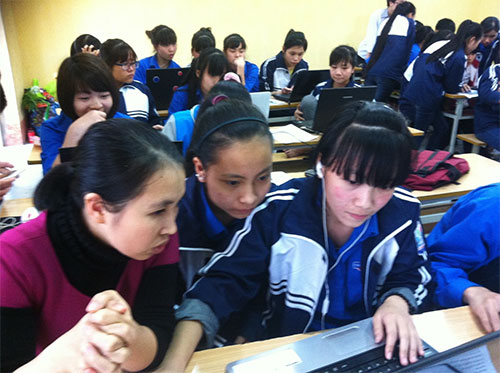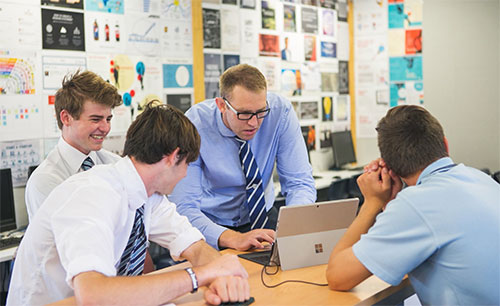A dedication to teachers
Tran Thi Thuy is English teacher of Duc Hop Upper Secondary School in Vietnam. She is also Microsoft Innovative Educator (MIE).
Thuy feels that her students do not get enough practice with English as they have few opportunities to communicate in the language. So she offers students a game of Mystery Skype that they’ve dropped their initial reservations and are now enthusiastically interacting with their classmates students from across the globe for the day.
Mystery Skype is a global activity that virtually connects two classrooms together, encouraging students to learn more about each other’s culture without going beyond the four walls.
“As an educator, my role is to provide the most conducive environment for learning,” said Thuy. “Technology helps me achieve that. With Skype, I can connect to other classrooms around the world, and thus encourage my students to learn.”
It is this vision that drove her to strive for innovation in the classroom, leading to her runner-up prize at the Vietnam National Teacher Competition 2016.
Her winning project was a Skype lesson about raising awareness of the dangers of pesticides in their area. By utilising a variety of technology tools, including Internet Explorer, Outlook, and PowerPoint, students had to research on the topic, reach out to experts, and present their findings through posters, banners, and standees.

Thuy’s students using technology to carry out their projects
Thuy is collaborating with another English teacher in Japan on how their students can explore a common social issue together: high levels of chronic stress in schools, which stems from the gruelling entrance examinations that students in both countries have to go through.
After sharing more about the challenges they face as students, they were tasked to think about how they could use technology to resolve this issue, and then present their solution to the teachers.
“By interacting with overseas students on Skype, my students are more aware about global issues,” Thuy shared. “Not only does it improve their communication skills, it also develops critical thinking skills and enhances creativity.”
Meanwhile in a town 10,000km away, Jarrod Aberhart, an economics professor at Nelson College, New Zealand, also implements the same philosophy of enhancing learning through technology.
“In this digital age, traditional classrooms are no longer conducive for learning. Students are born into technology, so why not teach them how to utilise it to better connect and collaborate with one another?” said Aberhart. “This pushes them to realise that with technology, the possibilities are endless as they can pursue goals that previously seemed out of reach.”
One of Aberhart’s favourite software to use in class is OneNote. As part of his courses, Aberhart’s students are required to group up and run a business—and he found that OneNote has been particularly useful in getting them to work together efficiently, both within and outside the classroom.
“Before I integrated technology into my course, progress on projects was slow,” shared Aberhart. “Students would work up a momentum on their projects in class, but once they stepped out of the classroom, it would come to a standstill. OneNote becomes a one-stop shop for them to communicate, work together and store information about their projects even outside classes.”

Aberhart working with his students on their projects in class using a Surface
As IT Professional Learning Leader at Nelson College, Aberhart plans to introduce TPACK and 21st Century Design (21CD) courses that emphasise the use of content and pedagogy in guiding technology integration into the classroom to teachers in the school.
His colleagues have already integrated technology in their lessons, and he hopes these will continue inspiring them to explore new ways of using technology which can help students develop crucial skills such as collaboration, critical thinking, and knowledge construction.
Lorelee Dedoroy Asignacion, an MIE teaching at Bata National High School in the Philippines, had a similar idea. Her journey began in 2012, when she was a finalist for the Microsoft Innovative Teachers’ Leadership Awards.
Her winning entry was an activity about raising environmental awareness among local officials, where students were required to use technology as a platform for conducting research on the environment, organising mangrove-planting sessions in other cities and creating presentations for local officials.
Since then, her students have enjoyed getting involved in other environmental projects such as clean-up drives and environmental camps, using tools such as Microsoft Word, PowerPoint, Publisher and PhotoStory, to share their findings on environmental issues.
Inspired by this experience, Asignacion endeavoured to introduce this to her colleagues. She demonstrated to them that even with limited Internet access in school, technology can still be integrated into lessons in many ways, such as by using quizzes created through PowerPoint and its hyperlink functions.
What the stars mean:
★ Poor ★ ★ Promising ★★★ Good ★★★★ Very good ★★★★★ Exceptional
Latest News
More News
- Russian President congratulates Vietnamese Party leader during phone talks (January 25, 2026 | 09:58)
- Worldwide congratulations underscore confidence in Vietnam’s 14th Party Congress (January 23, 2026 | 09:02)
- Political parties, organisations, int’l friends send congratulations to 14th National Party Congress (January 22, 2026 | 09:33)
- 14th National Party Congress: Japanese media highlight Vietnam’s growth targets (January 21, 2026 | 09:46)
- 14th National Party Congress: Driving force for Vietnam to continue renewal, innovation, breakthroughs (January 21, 2026 | 09:42)
- Vietnam remains spiritual support for progressive forces: Colombian party leader (January 21, 2026 | 08:00)
- Int'l media provides large coverage of 14th National Party Congress's first working day (January 20, 2026 | 09:09)
- Vietnamese firms win top honours at ASEAN Digital Awards (January 16, 2026 | 16:45)
- ASEAN Digital Ministers' Meeting opens in Hanoi (January 15, 2026 | 15:33)
- ASEAN economies move up the global chip value chain (December 09, 2025 | 13:32)
















 Mobile Version
Mobile Version